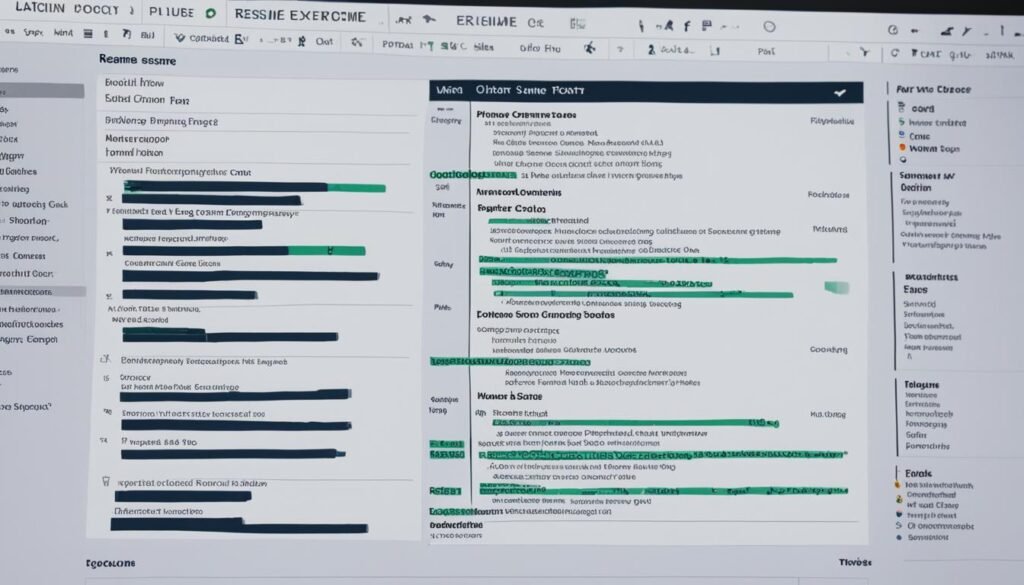The Importance of a Strong Resume
A strong resume is of utmost importance when applying for jobs after completing a Canadian Master’s program. It serves as your first impression to potential employers and plays a crucial role in determining whether you will be selected for an interview. A well-crafted resume can make you stand out amongst other candidates and effectively showcase your skills, qualifications, and achievements.
By creating a strong resume tailored to the job you are applying for, you can maximize your career potential and significantly increase your chances of securing the job you desire. Your resume acts as a personal marketing tool, highlighting your unique strengths and positioning you as a top candidate for the position.
Having a strong resume allows you to present your credentials and experiences in a clear and concise manner, making it easier for employers to assess your suitability for the role. It enables you to effectively communicate your value proposition to potential employers and demonstrates your commitment to professional excellence.
Stand Out Amongst Competition
With the competitive job market, a strong resume can give you a competitive edge. It helps you differentiate yourself from other job applicants and captures the attention of hiring managers. A compelling resume not only showcases your qualifications but also demonstrates your ability to contribute to the organization’s success.
By highlighting your relevant achievements, experiences, and skills, a strong resume provides tangible evidence of your capabilities and potential. It allows employers to envision how you can make a valuable contribution to their team and organization.
Tailoring Your Resume to Showcase Your Education and Experience

When applying for a job after completing your Canadian Master’s program, it is crucial to tailor your resume to highlight your education and experience. By customizing your resume to match the requirements of the job you are applying for, you can demonstrate your expertise and qualifications to potential employers.
Start by emphasizing your education gained from your Canadian Master’s program. List your degree, major, and university, along with any relevant coursework, honors, or specializations. Highlighting your educational background will show employers that you have received rigorous training and possess in-depth knowledge in your field.
Next, focus on your professional experience and practical skills. Include your internships, research projects, and any other hands-on experiences directly related to the job you are applying for. Describe your responsibilities, accomplishments, and how these experiences have prepared you for the role you are pursuing. By showcasing your practical skills and demonstrating how you have applied your knowledge in real-world settings, you can impress employers and stand out from other candidates.
Remember to quantify your achievements whenever possible. Include metrics, numbers, and specific outcomes to showcase the impact you made during your education and work experience. This will provide concrete evidence of your abilities and set you apart from applicants who only provide generic descriptions of their responsibilities.
Pro tip: Use action verbs to describe your responsibilities and accomplishments. Start your bullet points with words such as “achieved,” “implemented,” or “led” to convey your proactive approach and demonstrate your ability to take initiative.
Lastly, make sure to review the job description thoroughly and tailor your resume to match the specific requirements and keywords mentioned. Use similar terminology and phrases to show that you understand the needs of the position and can effectively contribute to the organization.
By tailoring your resume to showcase your education and experience, you can position yourself as a strong candidate for your desired job. Remember to update your resume regularly and customize it for each application to maximize your chances of landing an interview.
Highlighting Transferable Skills and Achievements

In addition to focusing on your education and experience, it is crucial to highlight your transferable skills and achievements on your resume. Transferable skills are the valuable abilities and knowledge you have acquired during your Canadian Master’s program that can be applied to a wide range of job positions. These skills demonstrate your adaptability and versatility, making you a desirable candidate for employers.
When showcasing your transferable skills, consider including examples of your communication skills, problem-solving abilities, and leadership capabilities. Communicating effectively is essential in any workplace, and highlighting your written and verbal communication skills can demonstrate your ability to work collaboratively with colleagues and clients. Equally important are problem-solving abilities, which show that you can identify challenges and develop innovative solutions. Leadership skills, whether demonstrated through leading a team or taking initiative within a project, illustrate your potential to take on higher responsibilities and drive success.
Furthermore, don’t forget to showcase your achievements in your resume. Your achievements can be tangible outcomes, such as awards, certifications, or promotions, which speak to your capabilities and recognition in your field. Additionally, include any significant contributions you have made to research, publications, or presentations which highlight your expertise and dedication. These achievements provide concrete evidence of your skills and value as a candidate.
By effectively highlighting your transferable skills and achievements, you can demonstrate to employers that you have the necessary qualifications and potential to excel in their organization. Crafting a compelling resume that showcases these aspects will significantly enhance your chances of securing job interviews and ultimately landing your desired position.
Formatting and Design Tips for a Professional Resume

The formatting and design of your resume play a crucial role in creating a professional and visually appealing document that catches the attention of recruiters. Follow these tips to ensure your resume stands out:
- Use a clean and organized layout: Opt for a clear and structured format with consistent spacing. Use headings and subheadings to differentiate sections.
- Choose a professional font: Select a font that is easy to read and looks polished. Stick to standard fonts like Arial, Calibri, or Times New Roman.
- Keep the font size consistent: Maintain a consistent font size throughout your resume to ensure a cohesive look. Use a font size between 10 and 12 points for the main text.
- Incorporate clear headings: Use bold or larger font sizes for section headings to make them stand out. This makes it easier for recruiters to quickly scan your resume.
- Utilize bullet points: To present information in a concise and scannable format, use bullet points for your responsibilities, achievements, and skills.
Here is an example of how bullet points can enhance the readability of your resume:
Work Experience - Developed and implemented marketing strategies resulting in a 15% increase in sales. - Managed a team of 5 employees, utilizing effective communication and leadership skills. - Collaborated with cross-functional teams to successfully launch a new product line.
Include relevant sections: Ensure your resume contains key sections such as contact information, education, work experience, skills, and references. Organize these sections in a logical order to highlight your qualifications effectively.
Use action verbs and quantifiable achievements: Begin each bullet point with a strong action verb to showcase your accomplishments and responsibilities. Additionally, include quantifiable achievements whenever possible to demonstrate the impact of your work.
Consider using a professional resume template: If you’re unsure about the visual design of your resume, consider using a professionally designed template. These templates provide a cohesive structure and can save you time in formatting your resume.
By following these formatting and design tips, you can create a professional resume that effectively showcases your skills, qualifications, and experiences.
Including Keywords and Tailoring Your Resume for Each Job Application

To increase the chances of your resume standing out and catching the attention of recruiters, it is crucial to include relevant keywords and customize your resume for each job application. By incorporating industry-specific terminology and aligning your skills and experiences with the requirements of the position, you can demonstrate your strong fit for the role and increase your chances of securing an interview.
When crafting your resume, carefully review the job description for keywords that are specific to the job you are applying for. These keywords can include technical skills, desired qualifications, or specific job responsibilities. By strategically incorporating these keywords throughout your resume, you can optimize it for applicant tracking systems (ATS) and increase its visibility to potential employers.
However, simply sprinkling keywords throughout your resume is not enough. It is important to tailor your resume to highlight your relevant skills and experiences that are most applicable to the job. Take the time to carefully analyze the job requirements and match them with your own qualifications. Focus on showcasing your achievements, accomplishments, and projects that are most relevant to the desired role.
Avoid using generic buzzwords and instead, provide specific examples that quantify your achievements. For example, instead of just stating that you have “strong communication skills,” highlight a specific instance where you effectively communicated complex information to a diverse audience.
In addition to customizing your resume for each job application, it is important to maintain a cohesive and professional format. Keep your resume well-organized, using clear headings and bullet points to make it easy for recruiters to scan. Use a clean and professional font to ensure readability. By integrating relevant keywords, tailoring your resume, and presenting it in a polished format, you can maximize your chances of getting noticed by employers and securing your desired job.
Showcasing Professional Development and Additional Certifications
To further enhance your resume and demonstrate your commitment to continuous learning, include any professional development courses or additional certifications that you have obtained. This can include workshops, online courses, or certifications related to your field of study or desired career path. By showcasing your dedication to expanding your knowledge and skills, you can position yourself as an ambitious and lifelong learner.
Continuing your professional development shows prospective employers that you are invested in staying current with industry trends and acquiring new skills. Certifications serve as tangible proof of your expertise in specific areas, making you a more attractive candidate to potential employers. When selecting professional development opportunities and certifications to showcase on your resume, focus on those that align closely with the job requirements and demonstrate your dedication to career advancement.
- Include the name, institution, and duration of each professional development course or certification.
- Highlight the key skills or knowledge you gained from each program or certification.
- Emphasize how your new competencies can add value to potential employers.
- Consider using bullet points to clearly present this information in your resume.
Highlighting Volunteer and Community Involvement
When crafting your resume, don’t forget to showcase your volunteer experience and community involvement. This is a great opportunity to demonstrate your commitment to giving back and highlight your interpersonal and leadership skills.
Volunteer experience can include activities such as helping out at local charities, participating in community projects, or contributing your time and skills to relevant organizations. By including these experiences on your resume, you show potential employers that you are not only focused on your own achievements but also dedicated to making a positive impact in the community.
Additionally, if you have served in leadership roles within student or professional associations, make sure to highlight these positions. These leadership roles demonstrate your ability to take initiative, collaborate with others, and effectively manage projects.
Showcasing your engagement beyond academic and professional settings makes you a well-rounded candidate and sets you apart from others. It also indicates that you have developed valuable skills outside of the classroom or workplace that can contribute to the success of an organization.
By including volunteer experience and community involvement on your resume, you not only enhance your overall profile, but you also demonstrate your dedication to making a positive impact. This will impress potential employers and increase your chances of standing out among other job applicants.
Key Points:
- Showcase your volunteer experience and community involvement on your resume to highlight your interpersonal and leadership skills.
- Include activities such as volunteering for relevant organizations, participating in community projects, or serving in leadership roles within student or professional associations.
- Highlighting your engagement beyond academic and professional settings sets you apart as a well-rounded candidate and demonstrates your commitment to making a positive impact.
- By including volunteer experience and community involvement on your resume, you enhance your overall profile and increase your chances of standing out to potential employers.
Conclusion
Creating a strong resume after completing a Canadian Master’s program is essential for succeeding in your job applications. By tailoring your resume to highlight your education, experience, transferable skills, and achievements, you can enhance your chances of standing out from other candidates. Additionally, paying attention to the formatting and design of your resume can leave a lasting impression on potential employers.
Furthermore, don’t forget to emphasize your professional development and any additional certifications you have acquired. These demonstrate your commitment to continuous learning and can make you a more competitive candidate. Additionally, showcasing your volunteer and community involvement can highlight your interpersonal skills and dedication to making a positive impact.
By following these tips and crafting a compelling resume that showcases your qualifications, you position yourself for success in your job search. A strong resume is your ticket to getting noticed by employers and securing the job you desire. Take the time to create a resume that reflects your unique experiences and strengths, and make sure to tailor it for each job application. Your Canadian Master’s program has equipped you with valuable skills and knowledge, and now it’s time to show the world what you’re capable of.
Source Links
- https://careers.nais.org/jobs/19629378/technical-theatre-director-instructor
- https://conservationhamilton.ca/human-resources-coordinator-2/
- https://www.ctvnews.ca/world/major-travel-disruptions-highest-number-of-us-flight-cancellations-in-six-months-1.6723650


